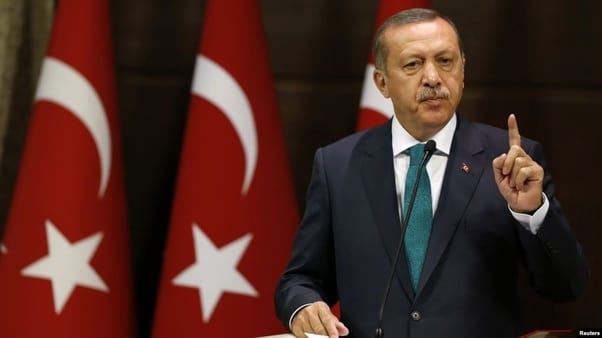Last updated on September 11th, 2021 at 03:07 pm
The Turkish government has taken steps to speed up the deployment of troops to Libya to help the U.N.-recognised Government of National Accord (GNA) against a renewed offensive ont the besieged capital by General Khalifa Haftar forces, which are backed by Egypt, France, the United Arab Emirates and Russia.
Turkish President Recep Tayyip Erdoğan said last week that a motion to send troops to Libya would be voted in parliament immediately after it returns from its new year break on Jan. 8.
But given the risk that Prime Minister Fayez al-Sarraj’s GNA might fail in fending off the escalated attacks by Haftar’s forces, the Erdoğan government decided to fast-track the motion, sending a warning to lawmakers of the ruling Justice and Development Party (AKP) to be ready for an extraordinary parliamentary session on Thursday.
Khaftar’s Libyan National Army (LNA) does not recognise the two accords Turkey and the Tripoli government signed in November. The first accord sees the two countries as maritime neighbours, ignores the territorial waters of some Greek islands and aims to block efforts by Cyprus, Greece, Israel and Egypt to build a pipeline to carry gas to Europe.
The second deal allows Turkey to provide troops, arms, military training and technical support to Libya, and to conduct joint exercises and share intelligence with the Tripoli-based government for three years.
Meanwhile Aguila Saleh, the head of Libya’s rival eastern-based parliament in Tobruk, visited Cyprus last week and asked the Cypriot foreign minister to request the European Union to withdraw its recognition of the Tripoli government.
Turkey’s secular main opposition Republican People’s Party (CHP) and the nationalist Good Party supported the government’s efforts to expand Turkey’s maritime borders, voting in favour of the memorandum of understanding signed with the GNA. But the two opposition parties objected to the military deal, and it was passed in the parliament by the Islamist AKP and its far-right allies.
The CHP has previously supported motions to send troops abroad, including military operations in northern Iraq and northern Syria, but the party strongly opposes deploying Turkish soldiers in Libya.
The opposition’s consent is important to the government since otherwise it will have to assume sole responsibility if things go badly wrong in Libya.
Foreign Minister Mevlüt Çavuşoğlu held meetings with CHP leader Kemal Kılıçdaroğlu and Good Party leader Meral Akşener on Monday, but failed to persuade them to drop their opposition to the deployment.
The CHP says the Libya deployment should be discussed in a closed session of parliament and voted by secret ballot. The CHP thinks some members of the ruling party would then vote against the motion, but President Recep Tayyip Erdoğan and his party officials have insisted on an open ballot.
Erdoğan’s Libya plans also threaten the country’s rapprochement with Russia, which supports Haftar’s forces in Libya. Russia has responded to Turkey’s moves in Libya by escalating the Russia-backed Syrian government assault on jihadist-controlled Idlib province in Syria. Erdoğan sent a delegation to Moscow last week to discuss Libya and Syria, but the two sides could not agree. More than 200,000 people have already fled the fighting in Idlib towards the Turkish border.
Putin’s scheduled visit to Turkey to open the TurkStream natural gas pipeline on Jan. 8 has become even more important. In order to garner support for his Libya plans, Erdoğan made a surprise visit to Tunisia last week, requesting the government there open a corridor to transfer military support to the GNA. Turkish media said Tunisia and Algeria had agreed to support Turkish plans in Libya, but the Tunisian presidency denied any such agreement, saying that it did not support any side in Libya.
The Turkish government has thus found itself isolated on its ambitious Libya policy, both inside and outside the country. In the Middle East, the only country that backs Turkey in Libya is Qatar.
Erdoğan’s aggressive policies in the region are also hurting Turkish businesses, particularly the construction industry, at a time when Turkey is struggling to reverse an economic downturn last year. Mithat Yenigün, the head of the Turkey Contractors’ Association, said on Dec. 27 that the sector, which in the past had raised $30 billion annually through projects abroad, would end 2019 with a mere $19 billion revenue from such contracts.
The Trade Ministry says Turkish contractors are still second place in the world after China in terms of the value of construction work in other countries. But, Yenigün said, “it would not be wrong to say that, particularly due to the negative image of our country created in the Middle East, we have lost jobs worth of $3 billion,” he said.

